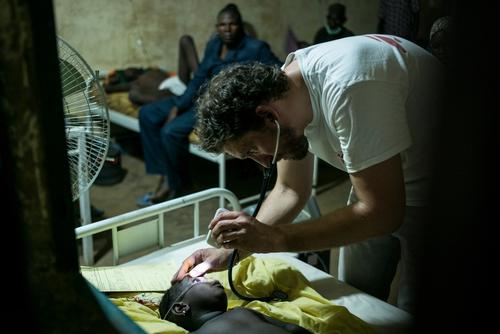A meningitis epidemic which has stretched across several regions of Niger has killed 352 people so far, with a total of 5,273 cases recorded by the health authorities since January [1]. Nigeria's capital Niamey has been particularly badly hit by the epidemic, with close to 1,200 admissions in the last week alone. Médecins Sans Frontières (MSF), in collaboration with the Ministry of Health, is stepping up its efforts with almost 430 beds to provide free medical care for patients.
Hundreds of emergency admissions each day in Niamey
“The situation is worrying because meningitis can kill 50% of those infected and leave neurological sequelae if it is not quickly treated,” says Dr. Louis Kakudji Mutokhe, medical coordinator for MSF in Niger. The admissions have decreased slightly over the past week, from 160 to 100 a day in Niamey’s Lazaret centre but vigilance is still required. "In urban areas, overcrowding can increase the risk of disease spread," explains Dr. Louis Kakudji Mutokhe.
Niger is battling different strains of meningitis in this epidemic. “The W135 and C strains are particularly deadly among young adults and children, as the population in this region is only immunised against the A strain following a major vaccination campaign conducted in 2010”, Mutokhe says.
The meningitis epidemics that occur in West Africa are usually caused by serogroups A and C, for which there is a bivalent A/C vaccine. However, this is the first time that epidemics of meningitis W135 and C have occurred on this scale in Niger.
Given the lack of vaccines available globally, the current priority is to focus on treating patients. As such, the medical teams are busy diagnosing and treating patients as soon as possible in order to reduce morbidity and mortality.
MSF has deployed medical teams to the Lazaret health centre, where over 3,000 patients have been admitted since the centre opened on 23 March. MSF will also support health centres around Niamey in treating simple cases and referring severe cases using five ambulances.
The epidemic has also struck Dosso and Tillabery region
In Dosso region, MSF teams are travelling to health centres in various villages in the Doutchi area to examine patients, collect medical data and provide medication to treat the disease. “Families are aware of how dangerous the disease is, but feel powerless against an epidemic which continues to spread. It is unacceptable that people continue to die from a preventable disease”, says Julien Matter, MSF Head of Mission in Niger.
In collaboration with the Ministry of Health, MSF has also deployed teams to vaccinate approximately 32,000 people in Bakin Tapki, Rouda Goumandey and Maikalgo.
“This meningitis epidemic could affect fragile health structures that are often unable to bear the financial costs of treatment", says Matter.



